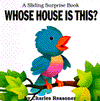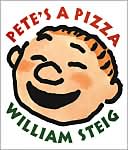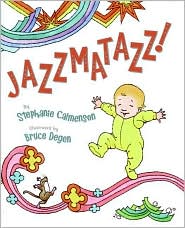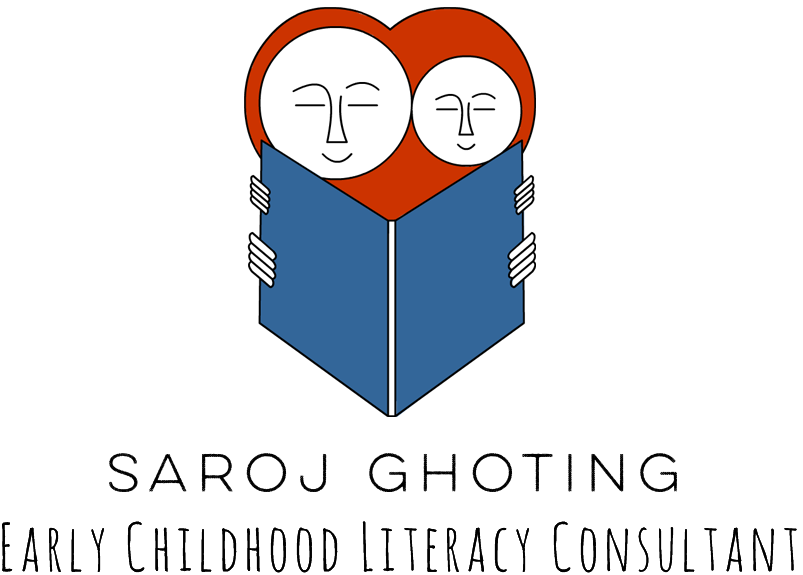 Aside: As your baby begins to talk, respond by elaborating on what he says. For example, if your baby points to a picture and says "cat" respond by saying, "Yes, that's a little cat with orange fur." Talking about the picture even if your baby doesn't understand everything also helps build your child's vocabulary. For example, you could say, "Look, the two kittens are playing with the string. They are having fun together."Submitted by Cindy Christin, Bozeman (MT) Public Library
Aside: As your baby begins to talk, respond by elaborating on what he says. For example, if your baby points to a picture and says "cat" respond by saying, "Yes, that's a little cat with orange fur." Talking about the picture even if your baby doesn't understand everything also helps build your child's vocabulary. For example, you could say, "Look, the two kittens are playing with the string. They are having fun together."Submitted by Cindy Christin, Bozeman (MT) Public Library
Board books
 Early Literacy Aside--Example: Board books are a great investment for babies! They allow babies to handle books freely, and even chew them. Good first choices are board books with pictures of everyday things. Try pointing to the pictures and then to the real objects around you.This helps babies get the idea that pictures and words are symbols for real things, a basic concept for later reading.Share a board book of your choice.
Early Literacy Aside--Example: Board books are a great investment for babies! They allow babies to handle books freely, and even chew them. Good first choices are board books with pictures of everyday things. Try pointing to the pictures and then to the real objects around you.This helps babies get the idea that pictures and words are symbols for real things, a basic concept for later reading.Share a board book of your choice.
Submitted by Cindy Christin, Bozeman (MT) Public Library
Nursery Rhymes
 Early Literacy Aside--Empower: Rhymes help teach "phonological awareness," an awareness of the sounds that make up words. You may have noticed that your child enjoys the way a nursery rhyme sounds even if it doesn't make much sense to him. When you introduce a new rhyme or song, repeat it at least twice. Three times is even better. And be sure to keep repeating the old, familiar rhymes too.
Submitted by Cindy Christin, Bozeman (MT) Public Library
Early Literacy Aside--Empower: Rhymes help teach "phonological awareness," an awareness of the sounds that make up words. You may have noticed that your child enjoys the way a nursery rhyme sounds even if it doesn't make much sense to him. When you introduce a new rhyme or song, repeat it at least twice. Three times is even better. And be sure to keep repeating the old, familiar rhymes too.
Submitted by Cindy Christin, Bozeman (MT) Public Library
Songs
 Early Literacy Aside--Explain: Singing songs is one good way for children to become aware of the different sounds that make up words. We call this phonological awareness. Singng helps them get a feel for the rhythm of language and how words are divided into syllables because there is a different note for each syllable. This will help them sound out words when they learn to read.
Submitted by Cindy Christin, Bozeman (MT) Public Library
Early Literacy Aside--Explain: Singing songs is one good way for children to become aware of the different sounds that make up words. We call this phonological awareness. Singng helps them get a feel for the rhythm of language and how words are divided into syllables because there is a different note for each syllable. This will help them sound out words when they learn to read.
Submitted by Cindy Christin, Bozeman (MT) Public Library
Whose House Is This? by Charles Reasoner
 Early Literacy Aside--Explain: There are many ways we can help children enjoy books as we share books together. Children who have positive experiences around books and reading are more likely to stick with learning to read even when it is difficult. I'll be pointing out some ways to share books to make it enjoyable.
As you read the book have children repeat the phrase, "I do. I'm a . . . " with each animal.
Early Literacy Aside--Example: Having the children participate by guessing the animals and responding when the animal appears helps them enjoy the book. This helps support their print motivation.
Early Literacy Aside--Explain: There are many ways we can help children enjoy books as we share books together. Children who have positive experiences around books and reading are more likely to stick with learning to read even when it is difficult. I'll be pointing out some ways to share books to make it enjoyable.
As you read the book have children repeat the phrase, "I do. I'm a . . . " with each animal.
Early Literacy Aside--Example: Having the children participate by guessing the animals and responding when the animal appears helps them enjoy the book. This helps support their print motivation.
Submitted by Tara Smith, Roanoke County (VA) Public Library
Very Busy Spider by Eric Carle
Read the book The Very Busy Spider by Eric Carle. Encourage adults and children to make the sounds of the animals.Early Literacy Aside--Example: Having your child hear and make the sounds of the animals in this story is one enjoyable way to help develop phonological awareness, to eventually be able to hear the smaller sounds in words. Submitted by Nancy Gattoni, Roanoke County (VA) Public Library
Pete's a Pizza by William Steig

Submitted by Linda White, Washington County (VA) Public Library
Old MacDonald Has a Farm Song
Early Literacy Aside--Explain: Researchers have found that one of the early literacy skills is phonological awareness. This is the ability to hear and play with the smaller sounds in words, like rhyming, playing with syllables or parts of words, and hearing beginning sounds of words. The beginning of this skills starts with children hearing and saying the sounds of animals.Sometime durng storytime sing "Old MacDonald" with the children, including several animals--cow, pig, sheep, chicken, duck, etc. Early Literacy Aside--Example: Making the sounds of animals contributes to phonological awareness and hearing sounds in words. Early Literacy Aside--Empower: Take advantage of opportunities to sing and say the sounds of animals with your children. It's fun and it also helps them hear the smaller sounds in words.
Submitted by Kimberly Burnette-Dean, Roanoke County (VA) Public Library
Jazzmatazz! by Stephanie Calmenson

Shapes--Explain Aside
Early Litearcy Aside--Explain: Today our early literacy tip is on letter knowledge. You may think of letter knowledge as being able to write letters. Actually there is a lot to know related to letter knowledge long before children can write the letters. One aspect is recognizing shapes. Today I'll be pointing out some fun ways we can help them recognize and talk about shapes.
Print Awareness--Explain Aside
Early Literacy Aside--Explain: Our early literacy tip of the day today is on print awareness. There are many ways we can help children understand that print has meaning. Research studies point out that about 95% of a child's attention goes to the pictures. Today in storytime I'll be pointing out some ways we can help them focus on the print as well.
Reading--Language of Books
Early Literacy Aside--Explain: Reading is one of the best ways to introduce new words to your children. Many books have unfamiliar words. ones we would not use in regular conversations with our children. Talking about even one or two of the words before, during or after reading the book is one way to build your children's vocabulary. Knowing lots of words, having a large vocabulary, helps children not only understand what they later learn to read, it also helps them recognize words when they later try to sound them out. Today we'll see how the language of books expands your child's vocabulary.
This Is the Way We Wash Our Face
Song: This Is the Way We Wash Our Face (Sung to the tune of Here We Go 'Round the Mulberry Bush)
Let's sing this song and tell a little story about how we take a bath.
"This is the way we wash our face (actions to words to all these)
shampoo our hair scrub our skin dry with a towel, etc. Early Literacy Aside--Example: This song helps us learn different vocabulary words about bathtime, like shampoo and scrub. I hope you will talk about this when you take a bath tonight. What other words can you come up with? Talking about interesting, fun words like this will help your children recognize words later on when they read them.
Submitted by Stacey Harwood, Henrico County (VA) Public Library, Twin Hickory Branch
Hickory Dickory Dock or Any Nursery Rhyme
 Early Literacy Aside--Empower: Nursery rhymes are important to do with your children, not only here in storytime, but at home as well. The rhyming and repetition of words helps your child develop the awareness of different word sounds. This helps develop their phonological awareness which is important for later sounding out words. Also, nursery rhymes are fun to sing and act out!
Submitted by Michelle Edwards, Gloucester Library (VA)
Early Literacy Aside--Empower: Nursery rhymes are important to do with your children, not only here in storytime, but at home as well. The rhyming and repetition of words helps your child develop the awareness of different word sounds. This helps develop their phonological awareness which is important for later sounding out words. Also, nursery rhymes are fun to sing and act out!
Submitted by Michelle Edwards, Gloucester Library (VA)
Storytime Handout: Animals All Around Us
Roll Your Hands (song) from Toddlers on Parade by Carol Hammett
Sing Roll Your Hands from Toddlers on Parade by Carol HammettWords: Roll, roll, roll your hands fast as fast can be. Do it now, let me see Do it now with me.
Tap, tap, tap your feet Shake, shake, shake your hips Roll, roll, roll your hands [Repeat one or two times all together. Clap together when done.]
Early Literacy Aside--Empower: This is a good rhyme to do as you are bathing or diapering your child. Use different parts of the body and words for different actions to help increase your child's vocabulary. Even though your baby does not understand everything you say, it is important for her to hear you say many words. The wider variety of words that your child hears, the larger her vocabulary will be, and the more easily they will later be able to read.
Five Little Ducks (song) from Rise and Shine by Raffi

Sing the song Five Little Ducks (on Rise and Shine by Raffi)
Early Literacy Aside--Example: There are many songs that have children say the sounds that animals make. Saying animal sounds is the beginning of being able to hear the smaller sounds in words, which later helps them sound out words when they learn to read!
